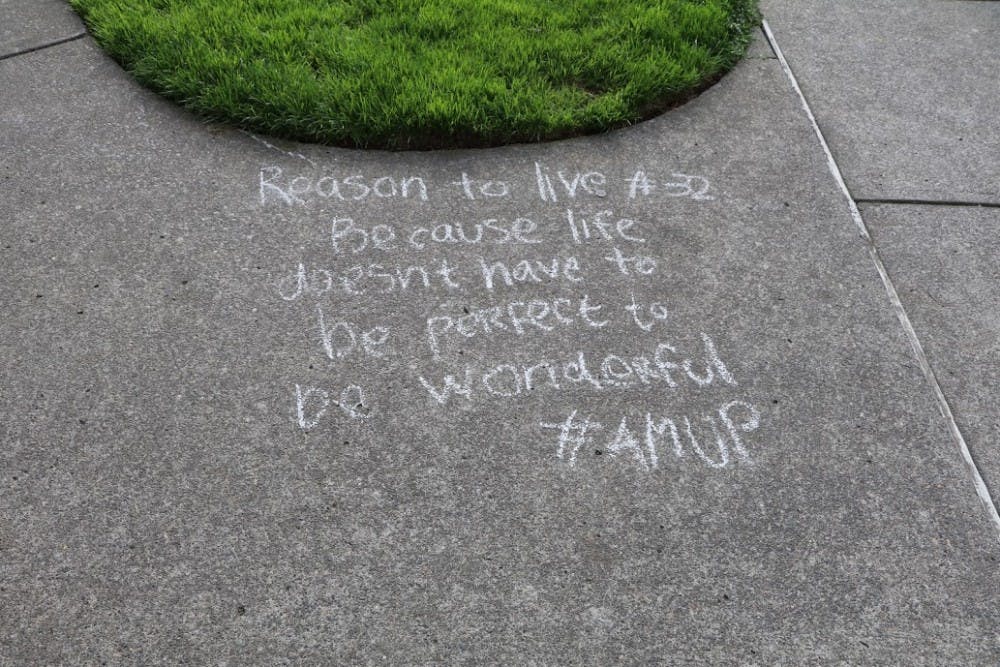Laughter, sunshine, family.
Students awoke last Thursday morning to discover that campus had been decorated with elaborate chalk drawings listing messages like these. The drawings were each one of “100 Reasons to Live” — a project done by Active Minds, the student-run advocacy group for mental health on campus.
Club co-president Kathryn Murdock said the project was simple yet had a big impact.
“(It’s) a reminder that the little things are sometimes the things most worth living for,” Murdock said.
Treasurer Jimmy Sheldrup added: “If you have something worth living for, that’s enough.”
The inspiration for the project was a video that the club produced last year entitled “100 Reasons to Live,” a campus-wide effort that has since received nearly 8,000 views on Youtube.

Club member Tayler Bradley said she feels students appreciated the drawings, and that even as club members were drawing them, students walking by expressed support for the project.
Murdock says the club recognizes that college students are especially prone to mental illness as it is a time of transition and new stressors, and when students have to learn to be independent. In other words, they have to manage “grown-up problems”.
Twenty percent of college students are diagnosed with or treated for a mental health condition, according to the National Alliance on Mental Illness (NAMI).
Active Minds wants to foster an environment on campus in which students feel comfortable discussing mental health concerns ranging from feeling overwhelmed and stressed to having panic attacks.
Club member Connie Wu added that the club “works to help everybody accept themselves.”
Murdock also mentioned that the change in mental health awareness is reactionary, noting that it took a number of suicides on campus for Active Minds to be founded. The group hopes to remove the stigma associated with mental health on campus.
“We want to encourage people to make the change, to give the support, to make things meaningful before there’s a tragedy,” she said.
NAMI states that stigma is the number one reason students choose not to seek treatment for mental illness, despite the fact that 75 percent of mental illnesses develop by age 24.

Another aim of the club is to hold the university accountable to the goals outlined in the five-year strategic plan to support student mental health.
Sheldrup said he feels University President Fr. Mark Pooman is highly determined to help improve the situation on campus, and thinks the University is making positive changes as a whole. Both Murdock and Sheldrup noted the resiliency of the UP community in coping with recent tragedies and working for change afterward.
“We couldn’t ask for a more supportive community,” Murdock said.
Active Minds is a national organization, which awarded the University of Portland chapter the Award for Transformational Change on Campus last year. The club will be presenting at the national conference in Sacramento in November.
The club has several other events already in the works for this year, including Fresh Check Day, another video and an event on MENtal health. Fresh Check Day will be “a mental health field day” designed to inform students. The video will be part of an “I will listen” campaign so that people can express their support for those experiencing mental illness.
The MENtal health event in Schoenfeldt on Oct. 27 is to encourage men to seek out help for mental health issues.
“(There is) a stigma against men getting help for mental health,” Sheldrup said. “(Men need to know) that it’s ok to not be ok. It’s ok to not be this individual rock.”








